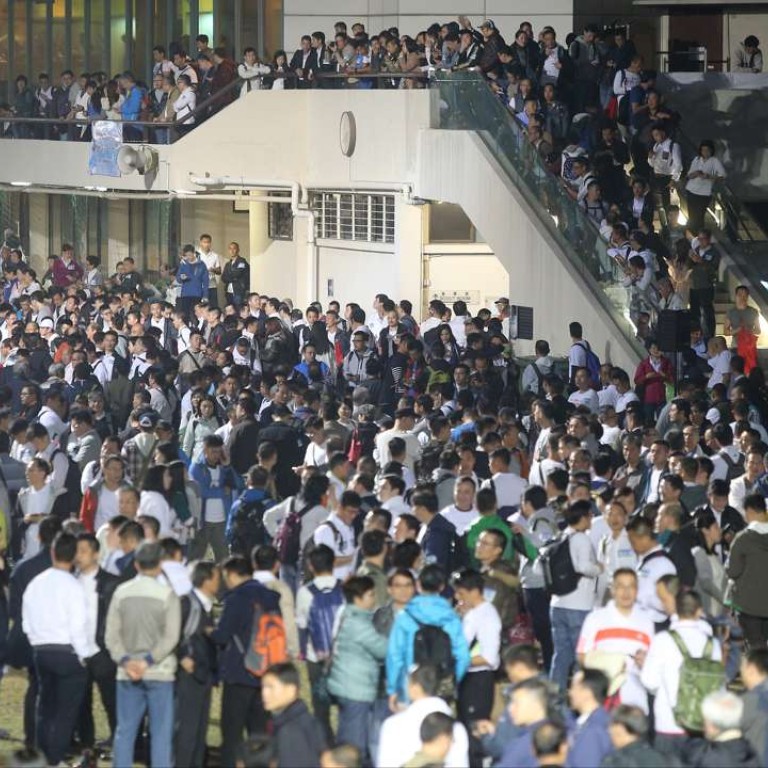
The illness at the heart of Hong Kong’s police force
The furore surrounding the Occupy Seven – as the officers jailed for assaulting an activist have come to be known – obscures a bigger problem facing the proud officers of the Hong Kong Police Force: a loss of authority
In the unlikely event that you have been living in a cave for the past few days – minus the obligatory smartphone – here are just some of the Hong Kong news headlines you missed.

In short, it would be no exaggeration to say that the past few days have been nothing short of momentous for anyone connected to the Hong Kong Police Force – past or present.
Should there be new laws protecting Hong Kong police from abuse?
Much of the commentary that followed the jailing of the seven officers for the assault on activist Ken Tsang Kin-chiu – and the police demonstration that followed – focused on the loud and on occasion racist chorus of criticism aimed at District Court Judge David Dufton who sentenced the seven officers.

The fact that such an attack was carried out by a group of police officers upon whom society depends to uphold and respect the law, makes the need for that punishment even more acute.
The consequences of the ongoing storm of condemnation surrounding Judge Dufton’s decision – should it be allowed to fester and mutate – could damage the administration of justice in the city.
Insiders worry as anger at officers’ jailing for Ken Tsang beating spreads through Hong Kong police
But in a sense the noise surrounding the fate of the Occupy Seven – as the jailed officers have come to be known – may obscure a much deeper malaise facing the proud men and women who serve and have served the Hong Kong Police Force since it was set up 173 years ago as a British colonial law enforcement organisation.

It may perhaps also shed light on why the police commissioner, Stephen Lo Wai-chung, has been loathe to openly condemn the actions of the seven men under his ultimate command who went to jail earlier this month and the more than tacit support his top brass colleagues gave to last Wednesday night’s show of force.

Hong Kong police chief calls on public to understand ‘tremendous pressure’ faced by officers in Occupy protests
His is a body of men and women who – whatever the individual rights and wrongs of specific operational decisions – have been asked to be the upholders-in-chief of centrality, fair play and political neutrality at a time when the city they police is going through one of the most politically charged periods in its history.
WATCH: More than 30,000 gather in support of jailed Hong Kong officers
Not only that, according to three veteran officers This Week in Asia spoke to after the gathering at the Police Sports and Recreation Club in Kowloon Tong, what has been vastly underestimated is the damage done to the confidence and self-respect of the force by two major incidents involving possible unconstitutional incursions by mainland law enforcement onto their “patch”.
“That is not a good look for any police force, anywhere in the world. Once you lose even a small amount of the authority any police force needs to do its job properly, you are on a slippery slope to public mistrust and potential acts of misjudgement by officers in an attempt to make up the lost ground,” said one officer.

The officer said that what for many may seem a mundane matter in these heady days of political protest, intrigue and change, can become bitter bones of contention with wider implications for a police force under pressure.

“It is too young to retire, especially when you don’t get the mandatory Provident Fund until 65, how do you support your family for 10 years?” the officer said.
He also said the force had a recruitment problem, with “nothing to join for, no job security, no leave, no benefits”.

“We are moving in a very dangerous direction towards becoming a puppet of the pro-Beijing camp, if this does not stop now there is no way back,” one long-serving detective said.
This Week in Asia requested an interview with Police Commissioner Lo but received no response from the Police Public Relations Bureau. ■

